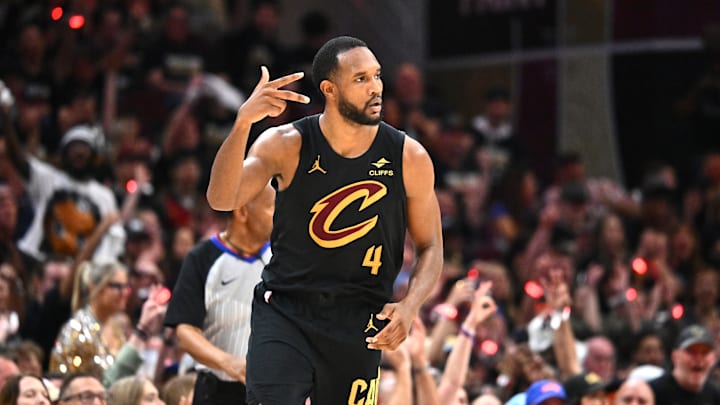Many voices around the NBA are proposing a change to the NBA's rules on how awards affect salaries and team payments -- but any change, were it to take place, would come late for the Cleveland Cavaliers.
Evan Mobley had a breakout season for the Cavaliers, becoming the two-way force the franchise foresaw when they took him No. 3 in the 2021 NBA Draft. That not only inspired a dominant season from the team, winners of 64 games, but it brought personal accolades for Mobley as well.
The fourth-year big man made his first All-Star Game, then followed that up by winning Defensive Player of the Year and making the All-NBA Second Team. Those were obviously momentous accomplishments for Mobley individually, and they highlighted the impact he had on the team's success. Yet the front office was likely wincing, not celebrating, when Mobley won those awards.
Evan Mobley got more expensive
The reason was something called the "Rose Rule" escalators in Evan Mobley's contract. The maximum a player can make coming off of their rookie contract is 25 percent of the salary cap, and that is what Mobley originally signed for. Yet years ago a provision was made for players who hit the highest of heights on their rookie deals to allow them to be paid more like superstars.
Written into his contract, therefore, were triggers to increase his salary up to 30 percent of the salary cap were he to make certain All-NBA teams or to win Defensive Player of the Year. Mobley did both, and either accomplishment was enough to raise his salary by around $8 million for 2025-26.
That difference was extremely significant for the Cavaliers. They were right at the second tax apron if Mobley's deal stayed at $38 million, and it would have been realistic for them to get under it for next season. Instead, Mobley pushed them so far over that they had no true chance to drop below that line, restricting their options on the trade market and in free agency.
The league has a problem
Mobley is far from the only test case, either. The Detroit Pistons saw the same thing happen with Cade Cunningham; his breakout season earned him a spot on an All-NBA Team, triggering the increased salary for this season. That tangibly altered the Pistons' offseason, as they went from being a likely cap space team to staying above the salary cap to execute their moves.
The Orlando Magic just signed their star forward, Paolo Banchero, to a maximum rookie contract extension. After trading for Desmond Bane this offseason, the Magic are staring down the barrel of the second tax apron themselves for 2026-27. As things stand, they should be able to stay under the line, not only giving them options to improve their team over the next couple of years but pushing back the clock on when they will have to break their team up.
If Banchero makes an All-NBA team next season, however, the Magic will rocket above the second apron, similarly to the Cavaliers this year. In essence, Orlando's management and perhaps many of its fans will spend this year hoping that Banchero is very good, but not quite good enough to trigger the Rose Rule salary increase.
That's an insane position for teams and players to have to take. Yes, those teams are negotiating those contracts, and like any other contract have to balance finding bargains with paying players their market value. Yet the current system forces teams and fans to root for less than player excellence; to put it another way, they are robbed of feeling pure joy when their team's young stars reach new heights.
An idea that has been bandied about for a few years is finding new life this offseason, one that would mean a change to the Collective Bargaining Agreement -- perhaps an amendment even sooner than the next agreement in 2029. Such a rule change would give teams relief on salaries that increase due to the Rose Rule.
There are a few different ways that this rule could function. Perhaps teams still count the total salary on their books but don't pay tax on that extra five percent. Perhaps aprons are calculated without that extra five percent. Given that these players are almost always on the teams that drafted them, this would be a reward to teams that identify and cultivate star talent -- the exact sort of franchise icon building the league should want to invest in.
The Oklahoma City Thunder are the ideal version of a team that is thriving in a small market by making smart transactions, and has built a young, dynamic team with real chemistry and culture. They could be the next dynasty, and yet the barrier to such a dream is that they will need to offer new contracts to their young co-stars, Chet Holmgren and Jalen Williams. If one or both players hit Rose Rule qualifiers next season, the Thunder will be forced to start breaking up their team years ahead of time.
That's a future the league needs to avoid. Perhaps they will see that and make a change. If it comes, however, don't expect it to matter for the Cavaliers, as Mobley has already crossed the line and the Cavaliers are already living the salary nightmare that is resulting. For a year or two, if Dan Gilbert is willing to pay up, that is sustainable. But eventually the league's rules will beat Cleveland down and force a change.
All because Evan Mobley was awesome. That's something the NBA needs to change.
